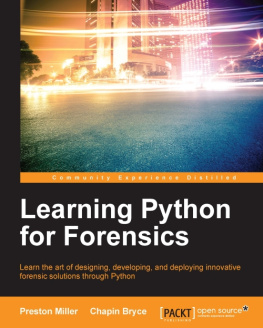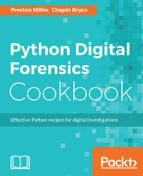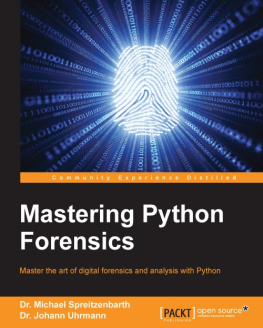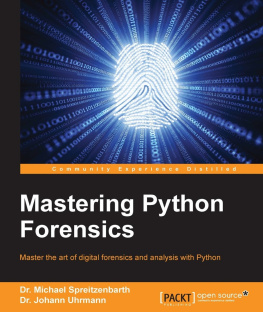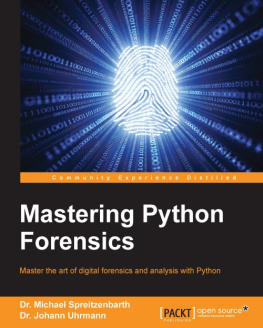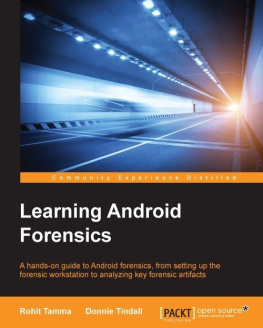Chapin Bryce - Learning Python for forensics : learning the art of designing, developing, and deploying innovative forensic solutions through Python
Here you can read online Chapin Bryce - Learning Python for forensics : learning the art of designing, developing, and deploying innovative forensic solutions through Python full text of the book (entire story) in english for free. Download pdf and epub, get meaning, cover and reviews about this ebook. year: 2016, publisher: Packt Publishing Limited, genre: Computer. Description of the work, (preface) as well as reviews are available. Best literature library LitArk.com created for fans of good reading and offers a wide selection of genres:
Romance novel
Science fiction
Adventure
Detective
Science
History
Home and family
Prose
Art
Politics
Computer
Non-fiction
Religion
Business
Children
Humor
Choose a favorite category and find really read worthwhile books. Enjoy immersion in the world of imagination, feel the emotions of the characters or learn something new for yourself, make an fascinating discovery.
- Book:Learning Python for forensics : learning the art of designing, developing, and deploying innovative forensic solutions through Python
- Author:
- Publisher:Packt Publishing Limited
- Genre:
- Year:2016
- Rating:5 / 5
- Favourites:Add to favourites
- Your mark:
Learning Python for forensics : learning the art of designing, developing, and deploying innovative forensic solutions through Python: summary, description and annotation
We offer to read an annotation, description, summary or preface (depends on what the author of the book "Learning Python for forensics : learning the art of designing, developing, and deploying innovative forensic solutions through Python" wrote himself). If you haven't found the necessary information about the book — write in the comments, we will try to find it.
Learn the art of designing, developing, and deploying innovative forensic solutions through PythonAbout This Book*This practical guide will help you solve forensic dilemmas through the development of Python scripts*Analyze Python scripts to extract metadata and investigate forensic artifacts*Master the skills of parsing complex data structures by taking advantage of Python librariesWho This Book Is ForIf you are a forensics student, hobbyist, or professional that is seeking to increase your understanding in forensics through the use of a programming language, then this book is for you.You are not required to have previous experience in programming to learn and master the content within this book. This material, created by forensic professionals, was written with a unique perspective and understanding of examiners who wish to learn programmingWhat You Will Learn*Discover how to perform Python script development*Update yourself by learning the best practices in forensic programming*Build scripts through an iterative design*Explore the rapid development of specialized scripts*Understand how to leverage forensic libraries developed by the community*Design flexibly to accommodate present and future hurdles*Conduct effective and efficient investigations through programmatic pre-analysis*Discover how to transform raw data into customized reports and visualizationsIn DetailThis book will illustrate how and why you should learn Python to strengthen your analysis skills and efficiency as you creatively solve real-world problems through instruction-based tutorials. The tutorials use an interactive design, giving you experience of the development process so you gain a better understanding of what it means to be a forensic developer.Each chapter walks you through a forensic artifact and one or more methods to analyze the evidence. It also provides reasons why one method may be advantageous over another. We cover common digital forensics and incident response scenarios, with scripts that can be used to tackle case work in the field. Using built-in and community-sourced libraries, you will improve your problem solving skills with the addition of the Python scripting language. In addition, we provide resources for further exploration of each script so you can understand what further purposes Python can serve. With this knowledge, you can rapidly develop and deploy solutions to identify critical information and fine-tune your skill set as an examiner. Read more...
Abstract: Annotation
Learn the art of designing, developing, and deploying innovative forensic solutions through PythonAbout This Book*This practical guide will help you solve forensic dilemmas through the development of Python scripts*Analyze Python scripts to extract metadata and investigate forensic artifacts*Master the skills of parsing complex data structures by taking advantage of Python librariesWho This Book Is ForIf you are a forensics student, hobbyist, or professional that is seeking to increase your understanding in forensics through the use of a programming language, then this book is for you.You are not required to have previous experience in programming to learn and master the content within this book. This material, created by forensic professionals, was written with a unique perspective and understanding of examiners who wish to learn programmingWhat You Will Learn*Discover how to perform Python script development*Update yourself by learning the best practices in forensic programming*Build scripts through an iterative design*Explore the rapid development of specialized scripts*Understand how to leverage forensic libraries developed by the community*Design flexibly to accommodate present and future hurdles*Conduct effective and efficient investigations through programmatic pre-analysis*Discover how to transform raw data into customized reports and visualizationsIn DetailThis book will illustrate how and why you should learn Python to strengthen your analysis skills and efficiency as you creatively solve real-world problems through instruction-based tutorials. The tutorials use an interactive design, giving you experience of the development process so you gain a better understanding of what it means to be a forensic developer.Each chapter walks you through a forensic artifact and one or more methods to analyze the evidence. It also provides reasons why one method may be advantageous over another. We cover common digital forensics and incident response scenarios, with scripts that can be used to tackle case work in the field. Using built-in and community-sourced libraries, you will improve your problem solving skills with the addition of the Python scripting language. In addition, we provide resources for further exploration of each script so you can understand what further purposes Python can serve. With this knowledge, you can rapidly develop and deploy solutions to identify critical information and fine-tune your skill set as an examiner
Chapin Bryce: author's other books
Who wrote Learning Python for forensics : learning the art of designing, developing, and deploying innovative forensic solutions through Python? Find out the surname, the name of the author of the book and a list of all author's works by series.

